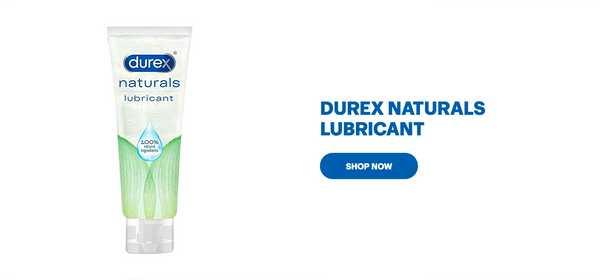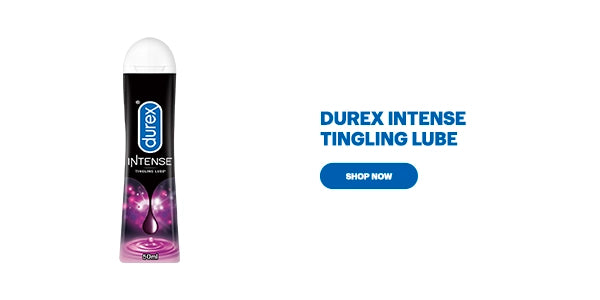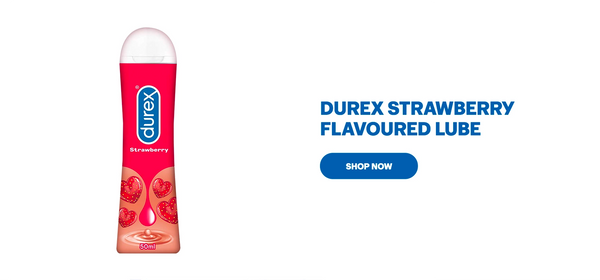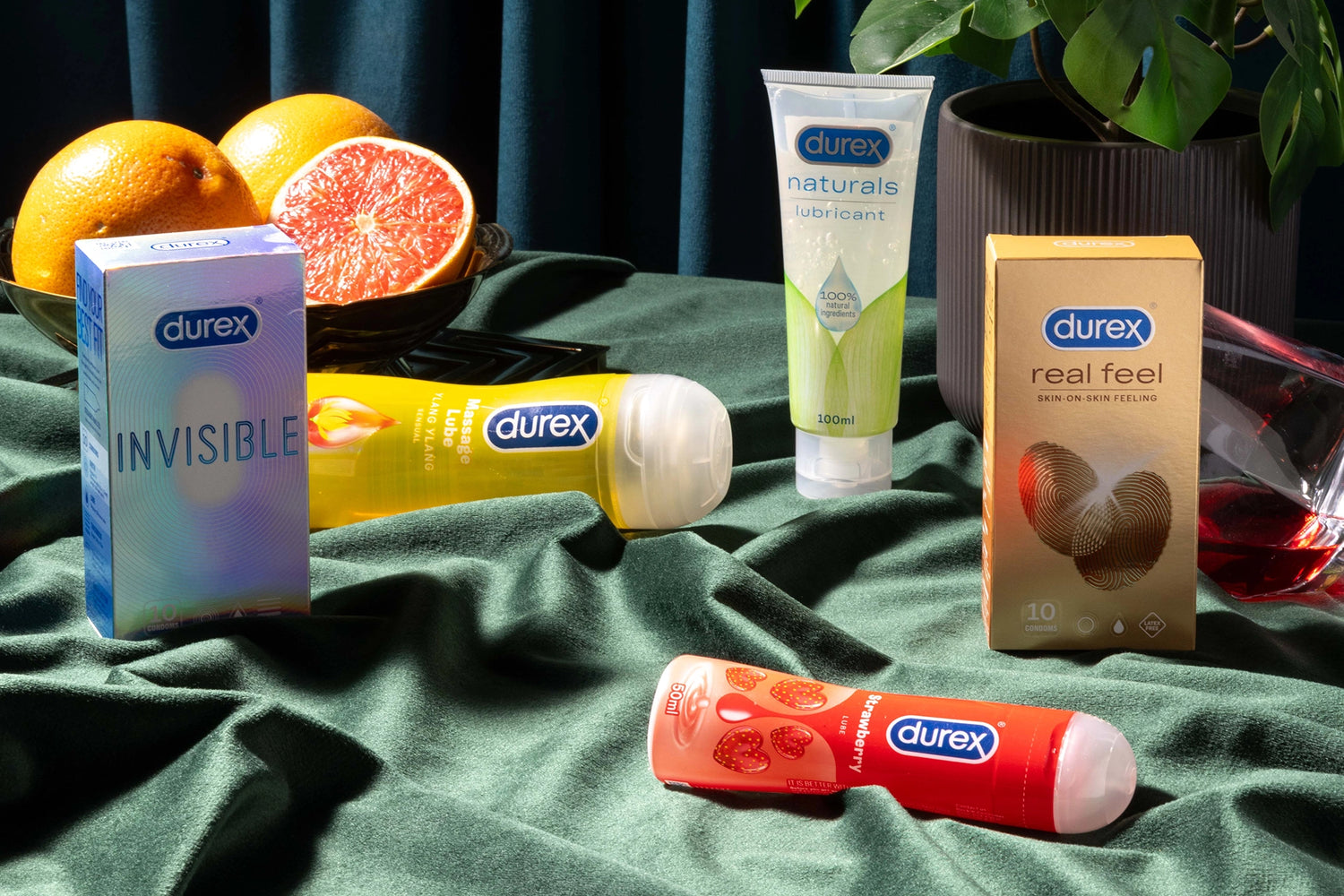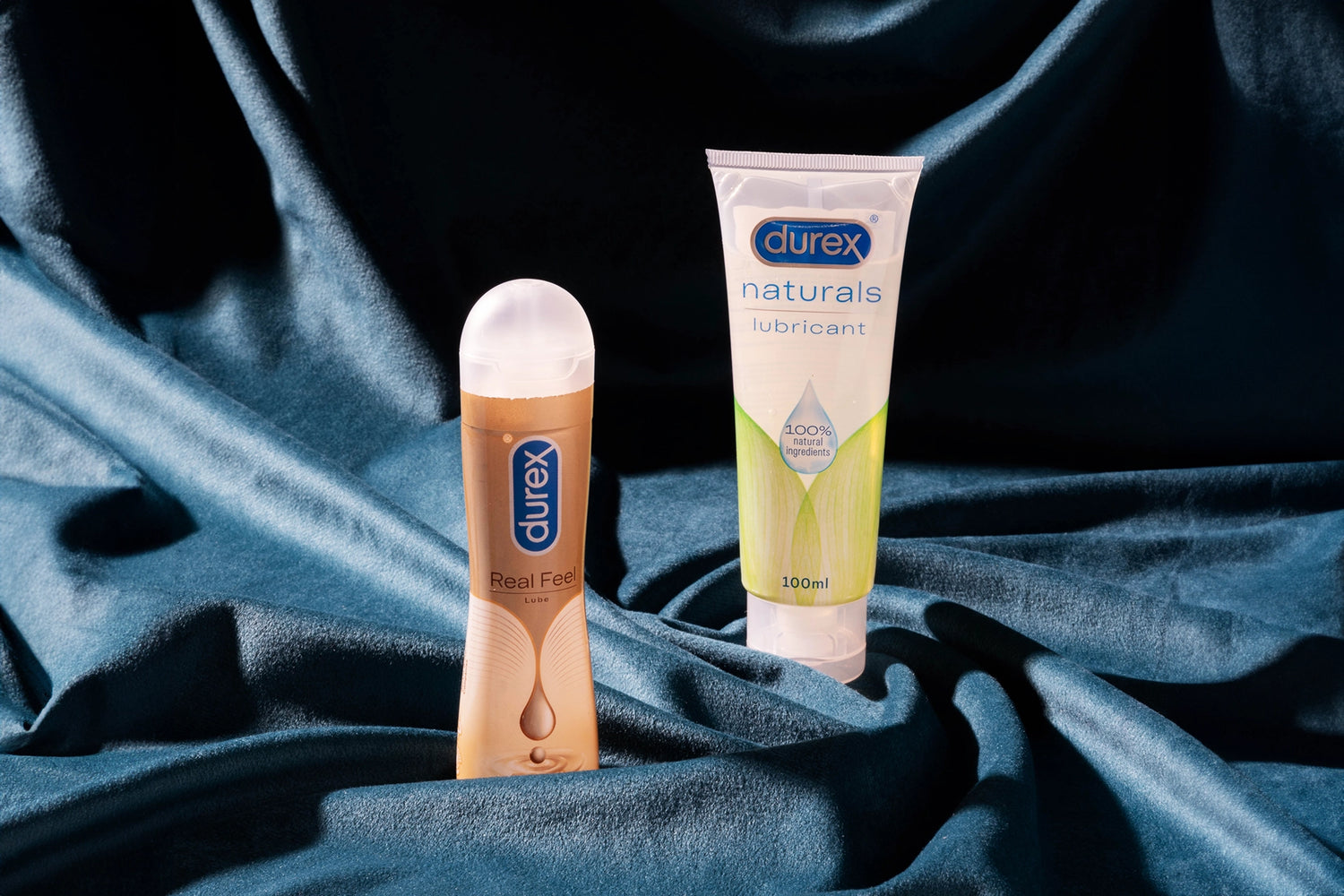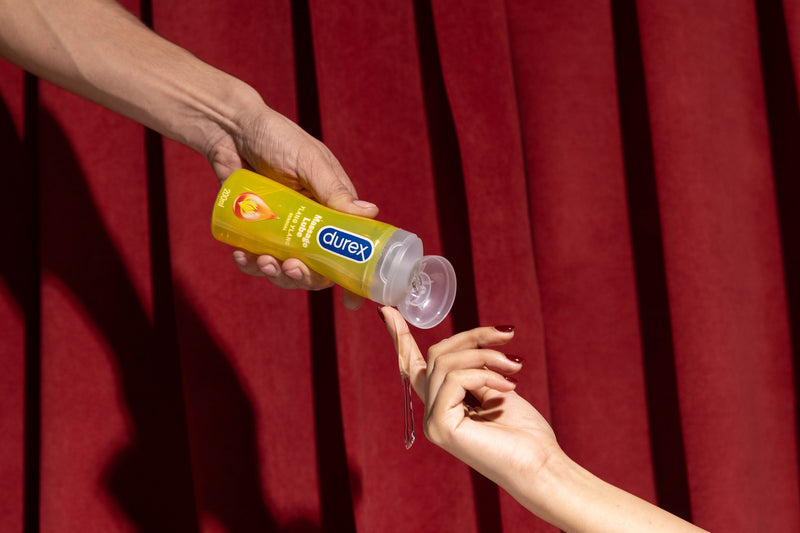
The Durex Guide to Choosing the Best Lubricant for Sex in 2023
Lube is often like the "elephant in the room" everyone wants to address but hesitates. There could be several reasons for this hesitation, but one of the most significant is the fear of embarrassing the partner.
Let's get this notion out of the way once and for all.
Studies worldwide have shown that most people enjoy using lubricant. In fact, women, in particular, love the slippery, smooth treat that cannot be achieved by saliva or DIY lubes (more on that later). Men looking for smoother genital arousal to achieve a firm erection also benefit significantly from pleasure products. It’s a simple and fun way to keep things wet enough.
In This Article:
What Is a Lubricant for Sex?
A lubricant for sex is a liquid that adds moisture to the vagina or anus for frictionless penetration.
Originally, aloe juice was used as a natural lubricant for penetration, followed by petroleum jelly and coconut oil. But let's face it - if they had been entirely effective, our ancestors wouldn't have sought alternatives. Perhaps, the pursuit of that elusive "nirvana in bed" has led us to an exciting breakthrough.
The trailblazing lubes ensure safe, long-lasting, and undeniably highly intimate experiences!
Many types of lubes or lubricant gels are available in the market, and it can get pretty overwhelming for first-timers to find the perfect match. The good part is that there is a lube for all your needs and preferences.
4 Benefits of Using a Lubricant for Sex
Using lubricants for sex have benefits beyond being a pleasure enhancer.
Ensures frictionless fun
Unnecessary friction can spoil the experience, especially if it leads to unbearable pain and bleeding. A lack of wetness can make your partner cringe and not want to indulge further. Most women start fearing the act of intercourse if the condition is not dealt with well.
Keeping a lubricant handy during difficult moments can provide an added layer of comfort and enhance overall experience for both partners.
Prevents injury
And you thought it was just about making sex pain-free? If you like it rough or enjoy different positions, a lubricating gel allows you to explore new sensations and introduce wildly textured personal devices without any fear of injury or tearing.
Reduces the risk of condoms breaking
Another critical point that most sex education classes miss is that lubricants for sex can significantly reduce the risk of condom breakage during intercourse, providing an extra layer of safety, especially during “risky” days.
Prevents tears and STIs during anal sex
Unlike vaginas, anuses do not self-lubricate. Anal penetration without adequate lubrication can be highly painful, uncomfortable, and often unsuccessful. The anal tears can make you more susceptible to STIs like syphilis, HIV, and gonorrhoea. A good lube will ensure safety for both you and your partner.
Why Homemade Lubricants Aren’t Good Enough for Sex
For years, people have used saliva and homemade lubes to achieve the desired effect. But their effectiveness and safety remain questionable. You can only experience the benefits of lubricant when you buy high-quality, commercially made products.
Saliva is a water-based lube that dries out quickly. The pleasure is short-lived, and the risk of bacterial infection, STIs, or anal infections is immense.
In contrast, coconut oil, the most commonly available lubricant in households, is generally not recommended for use with latex or polyurethane condoms. The components in coconut oil can cause latex to become porous and more prone to tearing or breaking
Moreover, homemade lubricants present a slew of other concerns, including:
Safety
Homemade lubes don’t always undergo rigorous testing and quality control like commercial products, leading to potential risks and allergic reactions.
Irritation
In an era of “Label Padhega India,” can you trust a product to enter your genitals that doesn’t even mention ingredients? Most homemade lubes contain ingredients, such as unrefined shea butter, aloe vera leaves, sugar, and vegetable oils, that irritate sensitive genital tissues, causing discomfort and potentially leading to infections. If you’re having it with someone you are not familiar with, the risk multiplies.
Lack of effectiveness
Homemade lubes may not provide the same level of comfort and longevity as professionally formulated lubricants, impacting the overall sexual experience negatively.
4 Types of Lubricants You Can Use for Sex
Now that you are fairly acquainted with the benefits of lubricants, you must be thinking about buying one. But can you just pick any lube off the pharmacy shelf? Not quite!
Each type of lube is best used for certain sexual situations. Let’s take a look at each in detail.
Water-based sex lubricants
If you're new to the rumpy-pumpy side of intimacy and eager to explore the realms of lubes, water based lubricant can be a good place to start. They are primarily made from 95% H2O (water) and boast a safe blend of ingredients like glycerin, propylene glycol, or hyaluronic acid.
What makes them a top choice for people who love to make love is that they work well with all types of condoms and toys, including silicone, rubber, or latex.
- Versatile option
- Safe to use with condoms
- pH balanced
- Won’t stain sheets
- Washes off easily
- Can dry faster than other types of lubricant
- Needs reapplication for prolonged activity
- Not suitable for water-based activities
Try Durex Naturals Lubricant, a gentle pH-friendly water-based formula that respects your intimate balance, is non-sticky and non-staining. Easy to use & easy to clean/rinse off.
Silicone-based sex lubricants
As the name suggests, silicone based lubricant is made using a unique blend of silicone fluid that promises long-lasting, velvety-smooth lubrication - a dream come true for those seeking extended and deeply satisfying intimate experiences. Many people endorse silicone-based lubes for the natural feel they provide.
Unlike water based lubes, they don't dry out quickly. This makes them a perfect solution for those who like to indulge in prolonged and rigorous acts from the book “Fifty Shades of Grey”.
- Safe to use with condoms
- Good for sensitive skin
- Longer lasting
- Feel more natural
- Not compatible with silicone toys
- Can be more expensive than water-based lubricant
An excellent silicone option is Durex Real Feel Intimate Lubricant. This lube is formulated using high-quality ingredients, free from parabens, artificial fragrances, and colourants.
Hybrid sex lubricants
If you’re looking for something that walks the line between water and silicone lubes, then hybrid lubricant might be for you. They play well with all condoms and personal devices - silicone, rubber, or latex – ensuring nothing hampers your pleasure. However, they may break down silicone massagers over time, and are not as easy to wash off as water-based lubricants.
- They don’t feel greasy or oily
- Have less irritation risk
- Easy to apply
- Good for sensitive skin
- Can break down silicone toys
- Can be harder to clean up vs water-based lubricant
Oil-based sex lubricants
Known for their versatility, long-lasting and body-safe properties, Oil-based lubes were once a popular choice for people with sensitive skin. Most oil-based lubes use natural oils as base ingredients which can have more disadvantages than advantages.
For starters, they can stain sheets and do not work well with latex. The oils used in these formulations can break the material down and cause it to tear, leading to increased pregnancy risk and STI transmission. Oil-based products are also associated with vaginal irritation.
So what's the best way to use oil-based lube? Use for external plays like oral sex, solo sex, and some hot body-to-body massage.
- Double for penetration and fun massage time
- Long-lasting
- Don’t require reapplication
- Safe for people with sensitive skin
- Can cause vaginal irritation
- Does not work with latex condoms
- Can destroy silicone toys
8 Things to Consider When Buying Sex Lubricants
So which is the best sex lubricant for you? It totally depends on your idea of the wild ride. While you’re already aware of the pros and cons of each type of lube, there are a few more considerations that you must keep in mind when choosing the lubricant for sex.
Communicate with your partner
Start by discussing your preferences, desires, and any concerns about using a lube. Open communication fosters trust and ensures both partners feel comfortable exploring new options.
Understand the sexual activities
Consider the sexual activities you'll be engaging in with your partner. Whether it's vaginal intercourse, anal play, oral sex, solo self-care, or the use of intimate massagers, having the right lube for the chosen play can make a world of difference.
Keep personal preferences in mind
Speak to your partner about skin allergies or sensitivities. Some people could be averse to silicone, while some highly-sensitive folks could get rashes even from a natural lube. The best place to start is the ingredient list on the label. Look for labels that market the product as “hypoallergenic” or safe for sensitive skin”.
Be considerate with safety
Safety always comes first. Ensure the lube is compatible with condoms, and if you're using it with silicone devices, it’s advisable to look for variants with balanced pH and a non-staining formula to avoid any unexpected mishaps.
WHO recommends that anal and vaginal water-based lubricants to ideally have a pH of 5.5-7 and 4.5 respectively. If you’re buying lube for the first time, make sure you research your options well.
Invest in quality
Invest in high-quality lubes that prioritize safety and comfort. While cheaper options may seem tempting, a quality lube ensures a better and safe experience.
Experiment with sensations
Apart from feeling slippery-smooth, some lubricants like Durex Intense enhance the experience by introducing cooling, tingling, or warm sensations.
Experiment with flavours
Flavour preferences can also add a delicious touch to your intimate moments. Durex offers a tempting range of flavoured lubricants for sex that you and your partner can explore.
Test compatibility
If you plan to a use lube with personal devices, make sure it is compatible with the material of your toys. Don’t mix silicone with silicone. It’s highly recommended to do a patch test on the surface of your toys to test compatibility. Avoid using lube gel on your toys that make the surface swell.
Take your time
Don't rush the decision. Enjoy the process of exploring different lubes together and make the selection part of your intimate bonding experience.
Most importantly, have fun with the process! Trying out new lubes can lead to exciting and pleasurable adventures in the bedroom, fostering a stronger and more intimate connection with your partner.
Lube up and change your sex life forever!

FAQs About Lubricants
Can I use coconut oil as a lubricant?
Coconut oil is generally not recommended as a lubricant for sexual activities. The natural components of coconut oil can weaken the latex material, reducing the condom's effectiveness in preventing both pregnancy and the transmission of STIs.
It is advisable to opt for water-based or silicone-based lubricants that are specifically designed to be compatible with condoms.
Can I use saliva as a lubricant?
While saliva can provide temporary lubrication, it tends to dry out quickly and may not offer sufficient moisture for comfortable and pleasurable sex. It's recommended to use water or silicone-based lubricants for better results and avoid infections.
Are there any side effects to using sex lubricants?
There are typically no significant side effects when using high-quality, commercially available lubricants as directed. However, some individuals may be allergic to preservative ingredients such as parabens, benzyl alcohol, and citric acid. Always check the product label and consult a healthcare professional if concerned.


